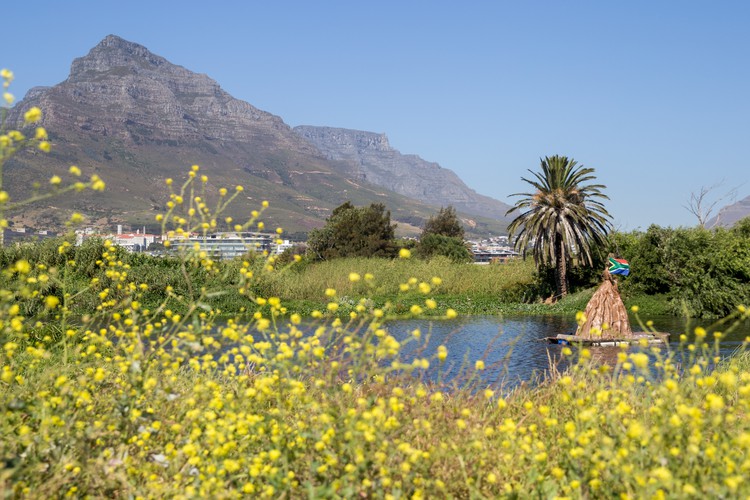Heritage Western Cape slams River Club development plan
The area along the Liesbeek is recognised as a sacred space, says HWC
Heritage Western Cape has slammed the study on which the developers based their proposed R4-billion property development at the River Club in Observatory, Cape Town.
The Heritage Impact Assessment conducted by Liesbeek Leisure Properties Trust, which owns the land, is inadequate, flawed, unsubstantiated, problematic, and fails to address the requirements of the Heritage Resources Act, according to Heritage Western Cape (HWC) chief executive Mxolisi Dlamuka.
In a “final comment” released last week, HWC said unless numerous issues were resolved, it could not endorse the proposed development.
Liesbeek Leisure Properties Trust has the backing of the City of Cape Town, the provincial departments of Environmental Affairs and Development Planning, and Transport and Public Works, in an ongoing appeal against a two-year protection order placed over the site.
The River Club lies within the proclaimed Two Rivers Urban Park, which includes Valkenberg, the South African Astronomical Observatory, Maitland Garden Village, and recently was extended to include Ndabeni.
A baseline study commissioned by the Department of Transport and Public Works was submitted to HWC’s Impact and Heritage Committee in April 2017. The committee found that the park within which the River Club is situated “is of extremely high heritage significance” as it is where “the Cape Indigene were first truly dispossessed of, and excluded from, access to their ancestral land”.
“It reflects the pattern of South Africa’s social architectural and political history spanning across the pre-colonial, colonial, apartheid and more recent history.” HWC’s committee recommended provincial, and possibly national heritage status for the park.
A finalised baseline study, including comments from other interested parties, has not yet been submitted. But in the meantime, the owners have gone ahead with the development application.
In the comment submitted last week, HWC’s Dlamuka says any application for the development of a property within the park area “is in danger of being compromised” unless the baseline study involves “meaningful consultation” with First Nation and “Cape Indigene” groups and incorporates their understanding of the significance of the site into the study.
He says the assessment submitted by the developers fails to address the requirements of the Heritage Resources Act.
In conclusion, he re-emphasises that the River Club falls within the park which is “recognised as a sacred place” and that “the open, largely undeveloped floodplain is a tangible reminder of intangible heritage”.
The developers say the floodplain floods only once in 100 years, despite common knowledge of the Liesbeek River regularly breaching its banks in winter. (A brief search of online news reports reveals extensive flooding in 2004 and 2012.) They propose it will be filled in with 260,000 cubic metres of sand and builder’s rubble if the development goes ahead.
Jody Aufrichtig, the director of Liesbeek Leisure Properties Trust, which bought the 14.8 hectare property from Transnet for R12 million in 2015, believes their “highly comprehensive heritage impact assessment more than adequately deals with the requirements” of the Act.
Aufrichtig is also a director of the Daddy Long Legs hotel and accommodation grouping of companies, WEX1 development in Woodstock, and co-founder of Indigo Properties which started the Biscuit Mill in Woodstock. He is listed as an active director of 34 companies, investment firms among them.
He said the “heritage process” was just “part of a much broader legislative development approval process currently underway, which includes a rezoning application and environmental approval processes”.
The development would have 150,000m² of floorspace, with 53% of it commercial office space, 20% residential units, 16% a gym, hotel and “ancillary space”, and retail taking up the remaining 11%.
Earlier this month GroundUp reported that a grouping called the First Nations Collective, led by Zenzile Khoisan, ha come out in support of the River Club development, despite initially being united in opposition with other Khoi and First Nation tribes.
Announcing the support of the First Nations Collective at a press briefing staged on 27 January, Khoisan said the development would now have a cultural, heritage, and media centre; an indigenous garden of medicinal plants; a heritage eco trail; an amphitheatre for performances; and First Nations symbols on the gateway and in the building designs.
This support for the development has been condemned by numerous Khoi traditional houses, including at least one – the Cochoqua – which Khoisan stated was part of the newly established First Nations Collective.
Several civic bodies, including the Two Rivers Urban Park Association, Observatory Civic Association, and the Mowbray Rosebank Civic Architecture and Planning Committee, continue to oppose the development.
Support independent journalism
Donate using Payfast

Don't miss out on the latest news
We respect your privacy, and promise we won't spam you.
© 2020 GroundUp.
This article is licensed under a Creative Commons Attribution-NoDerivatives 4.0 International License.
You may republish this article, so long as you credit the authors and GroundUp, and do not change the text. Please include a link back to the original article.

